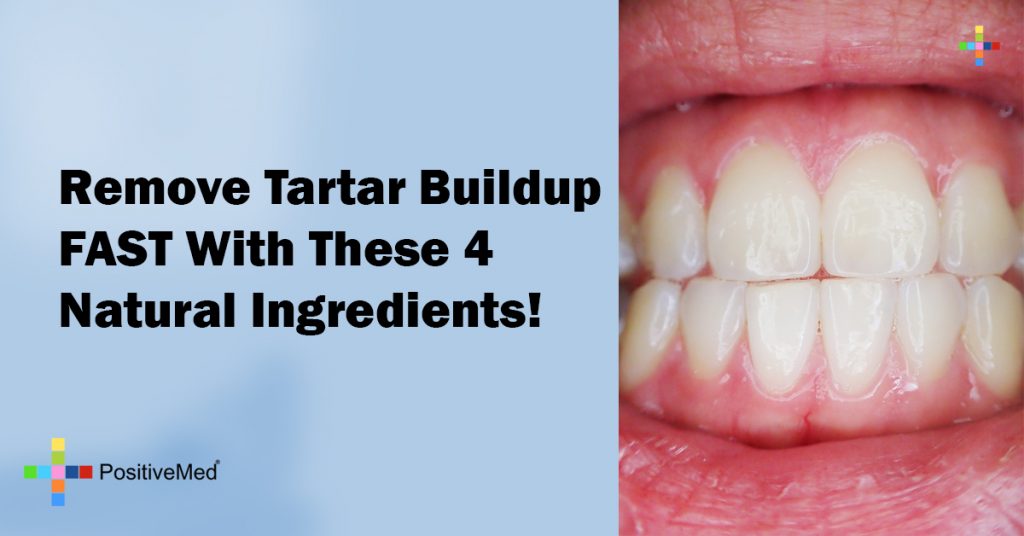
Maintaining good oral health is important for overall health and confidence, and plaque is a common problem facing most adults, even if they brush their teeth regularly. Plaque turns to tartar when left alone; it’s formed by accumulated bacteria in your mouth. You may notice it as a hard yellowish layer, also called calculus, on your teeth. To Remove tartar it usually requires a visit to your dentist; however, you can remove it yourself at home using natural remedies.

Here are some to help you maintain your lovely smile:
• Baking soda
This is the most well-known and often used tool for removing plaque. Simply pour a little baking soda into a small container, wet your toothbrush, put some baking soda on it and brush. You can mix a pinch of salt into the baking powder for more cleansing power as the salt will be a good abrasive agent along with the baking soda. This removes tartar effectively for just pennies per use.You can even make your own mouthwash : You will need one-half cup baking soda, one cup water, 10 drops essential lemon oil, 4 teaspoons vegetable glycerin, and 1 teaspoon aloe vera gel. Mix all the ingredients and store in a bottle; use once or twice a day for a combination of nice-smelling breath and plaque removal.
Update:Although in this recipe we used vegetable glycerin and almost-all commercial toothpastes use glycerin, many natural dentists say this glycerin film on teeth can prevent the teeth from being able to remineralize and therefore, it might weaken your teeth. Talk to a natural dentist to see if you should add glycerin to the mouthwash.
• Strawberries and Tomatoes
Strawberries and tomatoes have good quantities of vitamin C which is excellent for oral health. Rub these fruits directly onto your teeth and let sit for 5 minutes, this will soften any tartar build-up. Then rinse your mouth with baking soda mixed with warm water to remove plaque, leaving you with super-clean pearly whites. You can also use other vitamin C rich foods like bell peppers, berries, lemons, papaya, oranges, and lime in the same way. Do this about 2-3 times per week to remove plaque buildup that occurs through everyday eating.

• Food Coloring
Using food coloring is a great way to spot plaque on your teeth. First, dab a little petroleum jelly to your lips to prevent staining, take a couple drops of food coloring in a teaspoon of water and swish it around your mouth. Spit it out and rinse with clear water. Look for colored areas where the plaque has taken up the dye and remove them with your toothbrush. When performing regular brushing, pay special attention to those areas of your mouth. Spaces between the teeth and ridges on the teeth are prime targets for the buildup of plaque.
Related Link: A Tea That Removes Plaque Better That Commercial Mouthwash!
• Cheese
Eating an ounce of an aged cheese, like Swiss or Cheddar, before meals helps neutralize the acids that affect plaque production. More aged, fragrant cheeses work the best for removing plaque. Mothernature.com explains that a component in aged cheese acts as a buffering agent. The Student Care Center at the University of Chicago suggests eating raw peanuts for the same effect, neutralizing acids in the mouth and re-mineralizing teeth.
Besides these remedies there are a few other things you can implement into your oral health regimen:
• Brushing teeth regularly with a soft brush using vertical strokes. Concentrate on the space where teeth and gums meet as well as the spaces between teeth.
• Floss regularly to remove food particles and bacteria between your teeth. Food particles are the basis behind plaque formation.
• Eating spicy food
will also help keep your mouth clean. When you eat spicy food, it stimulates your salivary glands to make saliva and that saliva will clean your mouth naturally.
• Rub an orange peel on your teeth before going to bed and do not rinse off. This will help your teeth fight bacteria that contribute to plaque formation.
• Quit smoking. This is because tobacco products contain tar that sticks to your teeth, which results in plaque buildup.







